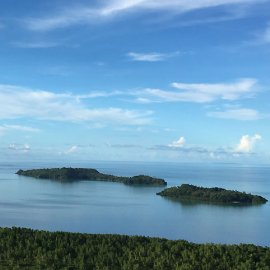A Haiku for Ocean Innovation in Japan
-
English
-
ListenPause
[intro music] Welcome to World Ocean Radio… I’m Peter Neill, Director of the World Ocean Observatory. We are drowning in a sea of data, rationalizing rescue as policy. This cryptic observation might well be a haiku, a Japanese poetic form that, in 17 syllables, distills a situation or an experience into its essence. To belabor the metaphor, the challenge of transmuting data to applicable policy is a cosmic thought, the focus of the international discussion between government agencies, research institutions, think tanks, and other organizations that collect the data and attempt to shape it into rules and regulations, grants and incentives that turn information into action. That is the poetry. If you attend international meetings and conferences these days, you will hear lyrical calls for more data, and resounding recitations for more policies to catalyze effective change on land and sea. The ambiguity, as in a haiku, is intended to affect the listener, to move her deeply toward realization and wisdom. Cautionary note: one is susceptible to these ethereal thoughts if one attends too many conferences. But the need is real: for applied policy, exploiting the data, to initiate new best practices and regenerative community efforts in the ocean world. A obvious key motivator is funding, and there are some organizations that might be singled out for their creative use of grants and incentives to stimulate such practical, transformative change. One such is the Ocean Policy Research Institute of the Sasakawa Peace Foundation in Tokyo, Japan. They have devised a framework and process that relates policy development with technology and market conditions, to innovate through community social engagement and partnership. Follow the thread from theory to practice, from study to cooperation to application to and local benefit. I will mention here five of their projects, each very different: The first is a community-based organizational plan for local eco-tourism and wildlife management of natural resources in a small archipelago of remote islands in Taketomi, Okinawa, that address such issues as marine debris disposal, ecotourism rules, local wildlife protections, port area environmental controls, and re-allocation of limited available funds to new applications—each a measurable, practical step forward. A second project is radical re-organization of shellfish harvest in Minami-sanriku, a small town in northern Japan, where oyster beds were destroyed by a 2011 tsunami, and traditional harvesters were left with a huge challenge to re-build. The solution was found in the transfer of individual fishers’ rights to a new collective, chartered to institute rehabilitation of the grounds, accelerate the recovery and growth of juveniles, maintain water quality in tidal and wetland areas through international certification standards, and generate supporting revenues through revived shellfish sales, associated bird-watching and eco-tourism, and increased employment and quality of life for the 13,000 residents of this coastal community. A third project is a very different application of technology and science: an ocean thermal energy conversion plant in Kumejima, Okinawa, which converts differential seawater temperature into electrical energy to power 250 homes. A complementary outcome is that the warmer residual seawater is distributed to adjacent shrimp, kelp and vegetable farms, to a local spa for therapy, and to a company for cosmetics production. Again: innovative technology with real social and financial improvement. A fourth project is located in Tonga and Vanuatu, two small island nations in the Pacific Ocean where conservation and breeding of giant clams and green crabs has been expanded through new collaborative management; increased product volume and sales; designated conservation sanctuaries and resource protections; employment of youth, women, and the disabled; and the training, making, and selling of associated crafts and souvenirs hand-made from by-products. Giant clams and green crabs as agents for change. A fifth project is in Onnason, also in Okinawa, a tourist destination popular with beachgoers and divers, where, however, climate impacts, specifically increased ocean temperatures, have caused bleaching of onshore coral reefs and a resultant severe challenge to the existing local economy. A new Consumers Cooperative was created among managers, fishers, and tourism businesses, to grow juvenile coral on an artificial island, transplanting thereafter to shallow water and deeper reefs as feasible, an expression of awareness and action and innovation. So, what is the common theme among all these projects? Note the specific application of specific policies: individual practice transformed into cooperative management; technology applied at appropriate, effective scale; new products and vocations; renewal from natural disaster and climate change impacts to a viable economy, with resultant social benefit for local places far away from the conferences and meetings. Thanks to the Sasagawa Peace Foundation for this prescient targeted philanthropy. Their Ocean Policy Research Institute is writing poetry, classic work, with no ambiguity at all. We will discuss these issues, and more, in future editions of World Ocean Radio. [outro music]
This week on World Ocean Radio we highlight the innovative work of the Sasagawa Peace Foundation in Tokyo, Japan, an organization using philanthropy to stimulate practical and transformative change for ocean communities in the Pacific, innovating through community, partnership and social engagements to bring about real and lasting change for communities, fishers, harvesters and others affected by severe weather, economic uncertainty and climate change.
Do you prefer the written word? Head on over to Medium.com/@TheW2O.
About World Ocean Radio
World Ocean Radio is a weekly series of five-minute audio essays available for syndicated use at no cost by college and community radio stations worldwide. Peter Neill, Director of the World Ocean Observatory and host of World Ocean Radio, provides coverage of a broad spectrum of ocean issues from science and education to advocacy and exemplary projects.
Image
Ocean Policy Research Institute | Sasagawa Peace Foundation
Sasagawa Peace Foundation | Pacific Island Nations Program
- Login to post comments



